A question I’m often asked is: How can I prepare my body for perimenopause and menopause? This transition can bring a mix of experiences—some empowering, others challenging. While menopause is a natural phase of life, it’s also one that can come with real symptoms that affect how you feel physically, mentally and emotionally. It’s important to remember that menopause is an important transition on the journey of womanhood that can be celebrated as a time of wisdom.
The good news is that the way you prioritise your body in the lead-up to perimenopause and during can make a real difference in your experience. Research suggests that supporting your health in your 30s and 40s—through nutrition, movement and lifestyle choices—can help ease the transition, making symptoms more manageable and helping you feel more in sync with the changes. By taking care of your hormones, metabolism, bone health and nervous system early on, you can empower your body to recalibrate with greater ease when the time comes to journey through perimenopause and menopause.
Naomi Watts opens up about experiencing early menopause
The more we understand what’s happening in our bodies, the better equipped we are to navigate this chapter with care, confidence and support.
Understanding perimenopause and menopause
Perimenopause is the transition phase leading up to menopause, which typically occurs between the ages of 35 and 50 and lasts anywhere from two to ten years. During this time, hormones fluctuate unpredictably, leading to changes in mood, metabolism, sleep and energy levels.
Menopause officially begins one year after your final menstrual period. While some symptoms ease as your body adjusts, others—like sleep disturbances, hot flushes or mood shifts—can persist. Understanding these phases means you can take proactive steps to support your body through them.
Why masturbation is the unexpected ‘treatment’ for menopause symptoms
It’s important to note that many symptoms of perimenopause and menopause overlap, but perimenopause is often when symptoms are most pronounced due to fluctuating hormone levels. In menopause, symptoms may persist but typically stabilise as the body adjusts to lower oestrogen levels.
Signs of perimenopause
Every woman’s experience is unique but common symptoms include:
- Irregular, heavier or more painful periods
- Shorter menstrual cycles (under 26 days)
- Breast tenderness
- Difficulty sleeping and night sweats
- Hot flushes
- Mood swings, anxiety or low energy
- Vaginal dryness and libido changes
- Increased migraines
- Weight fluctuations
Future-proofing your body through nutrition
What you eat plays an important role in supporting hormones and overall wellbeing during this transition.
- Protein and healthy fats, found in foods such as walnuts, tofu, salmon and eggs, help stabilise blood sugar, support gut health and provide sustained energy.
- Iron-rich foods, such as leafy greens, lentils, eggs and fish, are essential, as heavier periods in perimenopause can lead to iron depletion, affecting your energy levels and cognitive function.
- Eating a variety of whole foods, including whole grains, fresh vegetables and antioxidant-rich fruits, provides essential nutrients to support hormonal recalibration.
- Fermented foods, such as kimchi, sauerkraut and yoghurt, help support gut health, which plays a role in hormone health.
- Calcium and vitamin D are essential for maintaining bone health, as oestrogen levels naturally decline, increasing the risk of osteoporosis. Include dairy, leafy greens and fortified foods, and aim for regular sun exposure to support vitamin D synthesis.
- Phytoestrogens, found in flaxseeds, soy and legumes, mimic oestrogen in the body and may help ease symptoms such as hot flushes and mood fluctuations.
Limiting inflammatory foods such as processed foods, refined sugar and alcohol may also help, as these can contribute to worsening symptoms.
The role of movement and stress management
Hormonal changes during perimenopause can increase stress responses and accelerate muscle loss, making resistance training and stress management key in your routine.
Weight-bearing and impact exercises—such as strength training, Pilates and stair climbing—help preserve muscle mass and bone density, reducing the risk of osteoporosis.
Pelvic floor training is also important, as hormonal shifts can weaken these muscles. Exercises like Kegels and core stability work can support bladder control and overall strength.
Green exercise, such as walking outdoors, has been shown to boost mood and reduce stress, while low-impact activities like Tai Chi and yoga can support flexibility and relaxation.
Prioritising sleep is crucial, as perimenopause can disrupt sleep patterns. A consistent wind-down routine, reduced screen time and magnesium may help improve sleep quality.
Nutrients and herbs for perimenopause support
Certain nutrients and herbs may offer additional support during perimenopause, including:
- Magnesium, which has been shown to support the nervous system and may help relieve perimenopausal symptoms such as hot flushes and sleep disturbances.
- Vitamin B6 and B-complex, which support energy production, stress resilience and hormonal regulation.
- Zinc and iodine, which play essential roles in thyroid function, immunity and metabolism.
- Ashwagandha and chaste tree (vitex), which have been traditionally used to support hormones and emotional wellbeing.
Embracing the peri and menopause chapters with confidence
This phase of life is not always easy. It can be unpredictable, frustrating and deeply personal—and it’s okay to acknowledge that. Some women find relief with lifestyle changes, while others explore medical or therapeutic options. There’s no single right way to move through this transition—only the way that feels best for you.
Perimenopause and menopause do not mark ‘endings’—these are new chapters that can be met with strength, wisdom and self-care.













